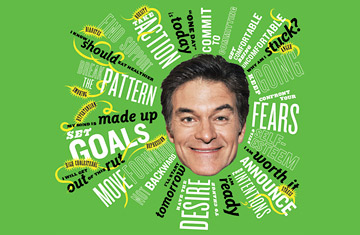
(4 of 5)
Achieving a goal doesn't always have to be a collective effort. Sometimes it can be simply a matter of breaking the job up into a lot of minigoals. Part of AA's genius is its "one day at a time" dictum. You don't have to quit drinking for the rest of your life; just do it today. Tomorrow you can make the same choice again. String together enough such days and you've put down the bottle for good.
In a 2007 study, a randomized clinical trial for postmenopausal women with Type 2 diabetes, investigators tested the effectiveness of the Mediterranean lifestyle--a regimen that includes regular exercise as well as a diet based on fruits, vegetables, olive oil, nuts, beans and lean meats, particularly fish and other seafood. The study found that the incremental approach works. Subjects who set short-term goals--increasing exercise sessions in five-minute increments, for instance--were doing better at the end of two years than a control group of people who simply adopted the program and, all too often, abandoned it later.
The Accountability Factor
Medication compliance is another critical area that can be improved by intervention and goal setting. From 50% to 75% of all hypertension patients currently prescribed drugs don't have their pressure under control because they fail to take the meds dependably. A 2006 study conducted by the National Heart, Lung and Blood Institute and published in the journal Disease Management used the transtheoretical model to try to improve those numbers in a sample group of 1,227 patients. All the subjects were in the pre-action phase: not complying but planning to. And all were given the assistance of both an onscreen and a paper transtheoretical workbook that used questionnaires and other tools to explore why they were stuck and what it would take to get them to move. Significantly, participants were surveyed three times during the study, meaning there was follow-up and accountability in the mix. A year after the study was done, 73% of those who had received counseling were compliant with their drug regimens, compared with just under 58% for a control group. At 18 months it was 69% to 59%. That's not 100%, but imagine slowing the No. 1 killer in the U.S. by simply getting resistant patients to take their statins and beta blockers.
I'm not pretending any of this is easy. Inaction is a powerful coping mechanism. Justification and rationalization are ways to handle feeling desperate, out of options, out of control. The National Institute of Mental Health published a revealing article in 2010 on the phenomenon known as emotional inertia--a sort of fixed state of depression, low self-esteem, anxiety or other condition that rarely seems to change even in the face of circumstances that warrant change. Using a series of role-playing games in which subjects were asked to work through a family problem, investigators found that when the need to act was most pressing, subjects dug into their habitual moods more than ever. The urgency paradoxically pushed them to cling more closely to the thing they knew, even if it was bad and unhealthy. I see this in some of my patients, who are so demoralized by their failure to lose weight or quit smoking that as soon as they leave my office, they seek comfort in a sundae or a cigarette.
